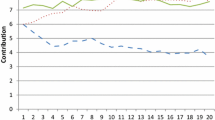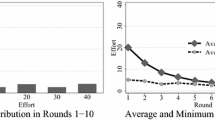Abstract
We study how the heterogeneity of agents affects the extent to which changes in financial incentives can pull a group out of a situation of coordination failure. We focus on the connections between cost asymmetries and leadership. Experimental subjects interact in groups of four in a series of weak-link games. The treatment variable is the distribution of high and low effort cost across subjects. We present data for one, two and three low-cost subjects as well as control sessions with symmetric costs. The overall pattern of coordination improvement is common across treatments. Early coordination improvements depend on the distribution of high and low effort costs across subjects, but these differences disappear with time. We find that initial leadership in overcoming coordination failure is not driven by low-cost subjects but by subjects with the most common cost type. This conformity effect may be due to a kind of group identity or to the cognitive simplicity of acting with identical others.
Similar content being viewed by others
References
Blume, A., & Ortmann, A. (2007). The effects of costless pre-play communication: Experimental evidence from games with Pareto-ranked equilibria. Journal of Economic Theory, in press.
Brandts, J., & Cooper, D. (2006). A change would do you good. An experimental study on how to overcome coordination failure in organizations. American Economic Review, 96, 669–693.
Brandts, J., & Cooper, D. (2007). It’s what you say no what you pay. An experimental study of manager–employee relationships in overcoming coordination failure. Journal of the European Economic Association, in press.
Camerer, C. (2003). Behavioral game theory: Experiments in strategic interaction. Princeton: Princeton University Press.
Cooper, D. J., & Kagel, J. H. (2003). Lessons learned: Generalizing learning across games. American Economic Review, 93, 202–207.
Croson, R. T. A., Fatas, E., & Neugebauer, T. (2005). Excludability and contribution: A laboratory study on team production. Mimeo.
Fatas, E., Neugebauer, T., & Perote, J. (2006). Within team competition in the minimum game. Pacific Economic Review, 11(2), 247–266.
Hirschleifer, J. (1983). From weakest-link to best-shot: The voluntary provision of public goods. Public Choice, 41(3), 371–386.
Van Huyck, J., Battalio, R., & Beil, R. (1990). Tacit coordination games, strategic uncertainty, and coordination failure. American Economic Review, 80, 234–248.
Weber, R. (2006). Managing growth to achieve efficient coordination in large groups. American Economic Review, 96(1), 114–126.
Author information
Authors and Affiliations
Corresponding author
Rights and permissions
About this article
Cite this article
Brandts, J., Cooper, D.J. & Fatas, E. Leadership and overcoming coordination failure with asymmetric costs. Exp Econ 10, 269–284 (2007). https://doi.org/10.1007/s10683-007-9182-0
Published:
Issue Date:
DOI: https://doi.org/10.1007/s10683-007-9182-0




